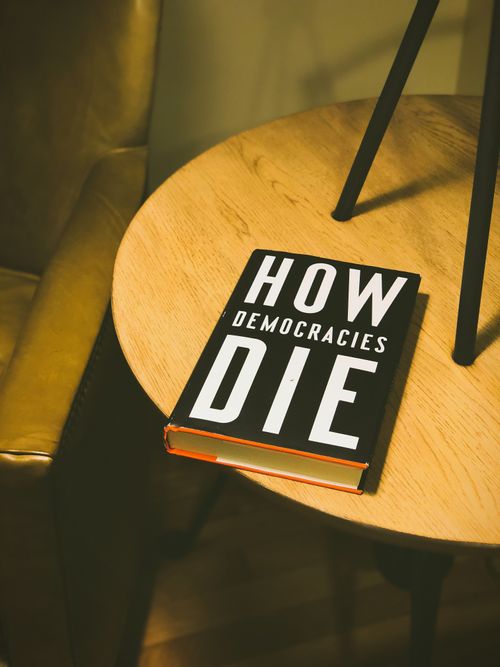Conventional wisdom suggests that Donald Trump is one of the best things that ever happened for cable news. Every day had a new story, and we were told that their ratings went through the roof.
I avoided cable news and vowed to never turn a single page in a book about the man, his administration, or anyone who now wants to tell us how they worked on the inside to save us all from certain doom. For this reason, I nearly skipped How Democracies Die by Steven Levitsky and Daniel Ziblatt.
This book, however, is the book to read if you want to know what we should be talking about instead
No Post-Mortem for American Democracy
Published in 2018, How Democracies Die earned a lot of attention. Barack Obama included it on his list of recommended books for the year, and The Washington Post named it one of the year’s notable books. I listened to author interviews and realized Levitsky and Ziblatt had a perspective on the problems that nagged me well after the 2016 election.
How Democracies Die does not offer a post-mortem as much as a diagnostic tool. Levitsky and Ziblatt offer a framework for directing our public attention to the questions that matter in evaluating the health of our democracy. The questions focus on democracy, not one man’s presidency.
Let’s Talk about Preventative Care for Democracy
Rather than avoiding all political conversations, I now want to talk about two concepts that take a lead role in Levitsky and Ziblatt’s book. They make clear that supporters of democracy need to champion these ideas—mutual toleration and institutional forbearance.
When we lament norm-breaking behavior, we assume that we are concerned about the same norms without ever naming them. This approach limits the effectiveness of those convesations. How Democracies Die can help us fill in the necessary details. For mutual toleration, we want to reinforce “the idea that as long as our rivals play by constitutional rules, we accept that they have an equal right to exist, compete for power, and govern.” We can center concern for a healthy democracy and opt-out of promoting behavior that has hastened its decline in other countries.
Taking a close look at the idea of institutional forbearance will help us look beyond the Oval Office. Instead of personalities or genius, we have to consider our institutions and the expectation that they will avoid “actions that, while respecting the letter of the law, obviously violate its spirit.” The diagnosis sounds as severe as I feared, but Levitsky and Ziblatt remind us that the condition is reversible. They write, “Institutions become political weapons, wielded forcefully by those who control them against those who do not. This is how elected autocrats subvert democracy.” We need to make these failures and the risks they carry part of the story when an officeholder runs for re-election.
“Since the end of the Cold War, most democratic breakdowns have been caused not by generals and soldiers but by elected governments themselves.“ —excerpted from How Democracies Die by Steve Levitsky and Daniel Ziblatt
Let's Get American Democracy the Attention it Needs
When we call for a volley of “return fire,” we become part of the anti-democratic forces at work across the country. But, with Levitsky and Ziblatt’s work in hand, we can transform those disparate conversations into productive calls to action. Now, instead of lamenting the norms that have been toppled, we can call out by name the norms we want to support. We can step into that role of a vigilant citizenry, a role James Madison imagined would be vital.
Levitsky and Ziblatt have provided the mission briefing for that role. We are resisting the calls to participate in the diminishing and dismantling of democracy. We know what to guard against, and we will not let the paradox of democracy surprise us.
How Democracies Die is a survival guide. We need to work through it together.
“The tragic paradox of the electoral route to authoritarianism is that democracy’s assassins use the very institutions of democracy—gradually, subtly, and even legally—to kill it.” —excerpted from How Democracies Die by Steve Levitsky and Daniel Ziblatt

